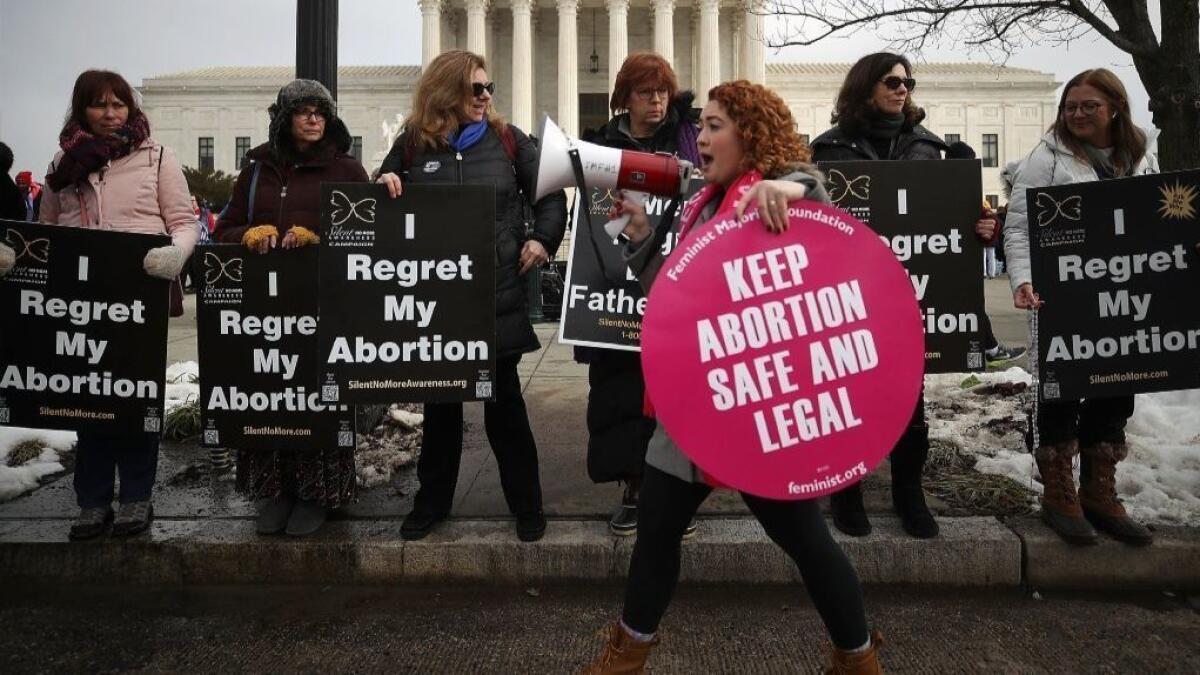Readers React: How antiabortion laws violate the Constitution’s prohibition on slavery

To the editor: Roe vs. Wade held 7 to 2 that it is a fundamental right of a woman, part of her personal autonomy, to choose to have an abortion, but that is no longer the law. Roe has been on “life support” since the 1992 case of Planned Parenthood vs. Casey, which purported to “essentially” uphold Roe but jettisoned the precept that a woman has a fundamental right to her personal reproductive autonomy. (“Some court decisions deserve to be overruled. Roe vs. Wade isn’t one of them,” editorial, May 16)
Post-Casey, states could fashion anti-choice legislation so long as the state’s restrictions did not impose an “undue burden” on the woman. Restrictions implemented since range from waiting periods of up to three days to doctors being required to tell women “false facts” about the supposed dangers of abortion.
Now, even before the laws in Georgia and Alabama percolate up the system, there are already abortion cases at the Supreme Court awaiting review. With the court’s new additions, the planets are aligned for an even greater Roe reduction.
What to do? Should we capitulate and return to the era of back-alley “medical” procedures? No. It’s time to reclaim a woman’s right to choose as a fundamental right — and try to do so even before this court.
Lawyers should add new arguments to their constitutional arsenal. Pregnancies forced to term by the government violate, first, the 13th Amendment’s ban on slavery and involuntary servitude, and second, the 9th Amendment’s protection of rights retained by the people even when those rights are not specifically enumerated in the Constitution.
I trust women to make their own health decisions. Courts and legislatures should too.
Julie A. Werner-Simon, Santa Monica
The writer is a constitutional law fellow at Southwestern Law School and a former federal prosecutor.
..
To the editor: The women in the photo carry signs stating, “I Regret My Abortion,” apparently believe the procedure should be illegal.
If a group of divorcees carried signs saying, “I regret my marriage,” would that be a sound argument against nuptials?
Linda Shahinian, Culver City
..
To the editor: Antiabortion laws clearly violate the 14th Amendment, which states:
“No state shall make or enforce any law which shall abridge the privileges or immunities of citizens of the United States, nor shall any state deprive any persons of life, liberty, or property without due process of law, nor deny to any person within its jurisdiction the equal protection of the laws.”
Discrimination against women should be ruled as a violation of the 14th Amendment’s requirement of equal protection of the laws for any person (yes, a woman is a person, an adult who can make her own moral decisions).
Let’s not waste our time and money any longer making a political ploy out of the lives and health of women.
Helen H. Gordon, Santa Barbara
Follow the Opinion section on Twitter @latimesopinion and Facebook
More to Read
A cure for the common opinion
Get thought-provoking perspectives with our weekly newsletter.
You may occasionally receive promotional content from the Los Angeles Times.






